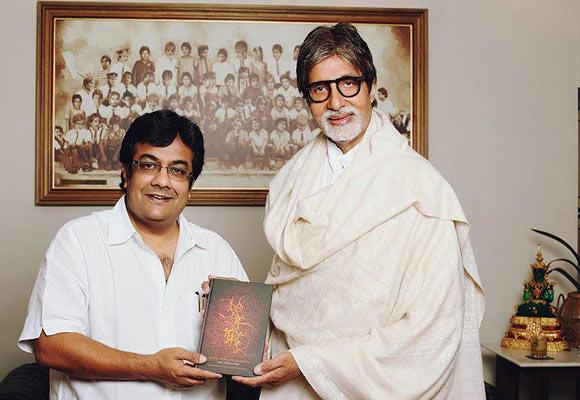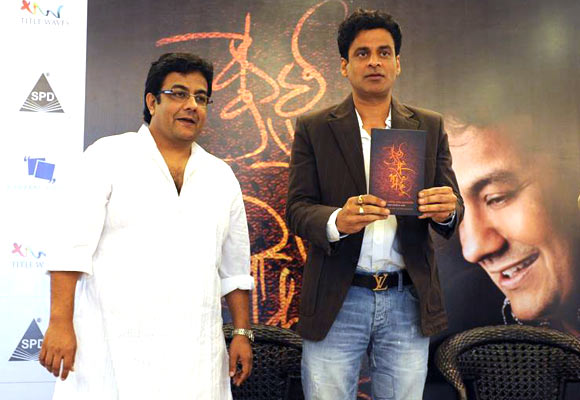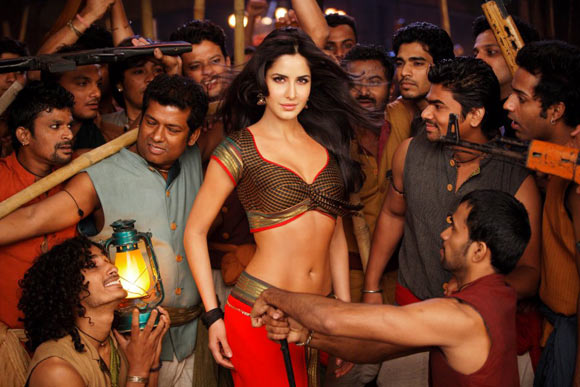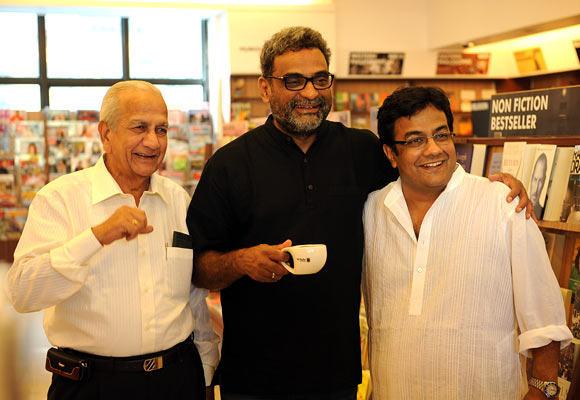Photographs: JWT India/Facebook
His love for the language, his grit to fight the odds, helped ad man Subramani Ramachandran realise his dream of publishing his book on Urdu poems. He recounts the valuable lessons he learnt that made this book possible.
When Subramani Ramachandran, aka Subbu, as he is known in the advertising industry, was introduced to an audience from Mumbai's Muslim-dominated Bhendi Bazaar area as the next shayar (poet) who would recite Urdu shayri (poetry) there was a stunned silence.
The moment he stood up to take his turn, he was greeted with expressions that screamed scorn: Suna, jaldi khatam kar, baki logon ke liye aaye hai, unko bhi sunna hai, jaldi khatam kar. (Come, take us through your drivel quickly, we have come here to listen to better shayars).
"I could feel the audiences' mood," recounts Subbu, who had done a dozen odd stage-shows before this particular event.
And then he began to regale his audience with his armoury of Urdu shayri. After every nazm (rhymed verse), the audience clamoured for more. When he finished his turn, he was overwhelmed to see the audience rise up and applaud the shayris of Subramani Ramachandran whose very name had drawn frowns a few minutes earlier.
This February he published his first book of Urdu poems Kuch Main Bhi Kahoon, that has a foreword from none other than Amitabh Bachchan.
Subbu's love for the Urdu language began early when his father's job took them to cities like Delhi, Lucknow and Hyderabad, where one can still find purists who romance the language.
Interestingly, it is this love for the language and the will to master it that made Subbu switch to advertising from the dreary rigours of being a sales guy, in which he was "extremely poor."
Since then, Subbu worked hard to not only hone his skills as an ad professional under R Balakrishnan (Balki) but also compile his romantic thoughts into a hardback book.
"I like writing more than advertising. Advertising pays my credit card bills and EMIs but writing is what gives me creative satisfaction," says Subbu, currently executive creative director at one of India's leading advertising agency J. Walter Thomson (JWT).
Like a writer who engages his audience with interesting anecdotes even as he informs and educates, Subramani Ramachandran, in this interview with Prasanna D Zore discusses his love for Urdu, his advertising career, the values he learnt from his parents and his success mantras.
'I was never the IIT-IIM type'
Image: The author with actor Manoj Bajpayee at the launch of his book Kuch Mein Bhi KahoonPhotographs: Subramani Ramachandran
How did your romance with Urdu begin?
My father had a transferable bank job and so I spent most of my childhood in Urdu-speaking, Muslim-dominated areas of cities like Delhi Lucknow and Hyderabad. Hindi films of course influence everybody in this country. But I got particularly attracted to the Urdu language, which sounded very nice to me.
Whatever I know or speak today of the language is purely self-learnt and self-taught. My interest in Urdu made me learn more about the language. I gradually started expressing myself in the language and it got appreciated. So I started believing that actually I was not that bad.
So, how did people react when they heard you speak and write a book on Urdu poems?
First, if you say your name is Subramani and you have written a book of Urdu poems, people don't believe you. Then they hear you speak and are taken aback and say 'he doesn't sound like a South Indian'.
I still remember the day when I was at a mushaira (a congregation of shayars where shayri is recited) in Bangalore, where an editor of an Urdu daily was also present. He walked up to me and said: 'I loved what you have written. So, I would like to publish this'.
I said I have a condition that I need my photograph next to my poems published in your paper. He refused to do it citing his paper's editorial policy. But I insisted and told him in that case I was not giving him my song. The next day he called me, we met up again and he told me I was being stupid to let such an opportunity go by because his was a widely circulated newspaper. He was amazed with my fixation to get my picture published.
I told him honestly that I don't read Urdu so when it gets published how would I find where my shayris gets published? And then they made an exception and published the shayris along with my photograph. That gave me the confidence that people would like to read what I write.
When did you decide to become a writer?
I was never the IIT-IIM type. I always believed that I would write rather than read what people have written. That's how it started.
And advertising?
Poetry got me into advertising actually. I was with The Times of India group for a year in the circulation department and I had a boss called Jamaal who is now with The Khaleej Times. When he listened to what I had written he advised me to join advertising. 'They pay you good for writing,' he told me.
When I walked into Lintas, in 1992, and met their creative director Deepak Bhise – he eventually hired me – I told him that I am into shayris but have no clue about advertising but I will write whatever you ask me to.
At M G Road in Bangalore there was a shop called Vijay Laxmi Sales and Saris. He said, 'assume that it is my client and I want you to write a radio jingle for them.' I said I would call your secretary tomorrow and tell you what I have done. He said 'this is not a mushaira, this is advertising. So you sit here and write the jingle now. I am going to the loo; I will be back in ten minutes. Get that jingle in ten minutes.'
I had never done that before and I told this to myself: if I don't do this I will have to go back to The Times of India and I am so miserable at sales. I thought for a while and wrote four lines:
Rango main baharon main Vijay Laxmi
Pehne sab tyoharon main Vijal Laxmi
Sariyan toh hai bahot magar
Hai ek hi hazaaron main Vijal Laxmi
I waited for him; he walked in after some time. He asked me for the jingle and I narrated it to him. He heard me out and he said: 'How much do you want?' I asked how much he would pay me. He said, 'we don't pay much. We will take you as a junior copywriter and pay your Rs 1,850.'
I took the job.
Three years later Balki joined Lintas and it has been on a roller coaster ride since then.
'I can't write Chikni chameli'
Image: A still from the film AgneepathHow did Mumbai happen then?
One fine day I told myself I need to hang the advertising job and move to Bombay to become a lyricist. Everybody including Balki asked me not to try the stunt. I said jo hoga dekha jayega (let me take the risk irrespective of the consequences).
I want to become a writer so I will go to Bombay and one day I will have my name on the hoardings and make it as a writer in the city, no matter what. So, I moved to Rediffusion and then I wrote a film called Bas Yun Hi, which didn't do too well but the songs were appreciated.
What makes you feel joyous: advertising or writing?
I did a couple of albums; I did the Mumbai Anthem and for the first time 18 Bollywood singers came together to cut an album. That gave me a lot of creative satisfaction. It was an amazing experience. I can't write Chikni chameli. Nothing derogatory but that is not my style of writing. I salute the people who write these songs but I can't write that kind of stuff.
If you are giving me four minutes of your life to listen to my songs, I have to give you something. I have to either remind you of some memory or make you empathise with my song; I have to touch the guy's heart. (This has been my) very simple philosophy. I can't con the man.
Balki would always ask us about our advertising: What is in it for me? Will you make my 30 seconds useful? Will you inform me? Will you entertain me? Will you give me information that I don't know? Will you excite me? Will you make me laugh? Will you bring a lump to my throat or tears into my eyes?
Being an advertiser I do what people ask me to. Advertising helps me pay my credit card bills, petrol bills and my EMIs. But writing gives me creative satisfaction. Because while writing I write the way I feel, to express my emotions. The minute somebody pays me for it they will start dictating terms.
Did you adopt the same philosophy for your book Kuch Main Bhi Kahoon?
When you read my book, you will notice I have kept it simple. I didn't want to showcase my knowledge of the language to my readers. I don't want to show off. I want you to be with me. When you open the book I want you to feel like finishing the book. I want you to hear what I have to say.
If I am very beautiful and snobbish, you will not talk to me. Amitabh Bachchan became a hit in KBC because everybody expected him to be like a God but when he, through his act, conveyed a message that he was just like one of us, people said kitna different hai yeh (how different he is).
My book has to be down to earth. My book should not showcase the arrogance of language. It should not tell you, how much Urdu I know. It has to tell you if this particular thought occurred to you, if a particular moment happened to you. Will you be with me in the journey? If the journey is tough, you will not come with me. It will be like I am tired now, you please proceed yaar.
Poetry allows you to rationalise a lot of things in life. It's about sharing experiences and most of my poems are a balance of philosophy and romance.
If your poetry exhibits the arrogance of language then you are automatically building a wall between you and your reader. You are conveying that your audience can't match your level. If you preach to your readers then you don't get their attention. Nobody likes to be preached. You have to be with the reader.
Which is why if you see the entire feel in the book it is extremely simple. It is intentional.
'My parents have been huge role models for me'
Image: The author with two of his role models: his father (left) and R Balki (in the middle)What did you find more difficult: Writing the book or publishing it?
Writing the book wasn't a challenge but publishing it was. Nobody wanted to publish my Urdu poems.
I approached almost ten people. Since I come from an advertising background I wanted the book to be published in a hard bound form. But then they said the book would become costly... the cost would go to Rs 300 and nobody would want to read me by spending Rs 300.
It was fair enough and I understood their point of view. And this went on and on. They asked me to do paperbacks and I didn't want to do those cheap paperbacks. I wanted people to see me as a serious writer.
I knew that a Hindu Tamilian writing a book on Urdu poetry would go against me. Also, the lack of interest in reading books would also go against me. Nobody ever said it was a good idea to publish me. But this was the only realm where I could write what I wanted to write without anybody dictating what should be there in the book.
Then once when I was with Amitji (Amitabh Bachchan) during a shoot I told him about my poems and desire to publish them and proposed if he could write a foreword. We have worked for over 30 films together and so I took that liberty. He said okay. So I said please read the book and let me know if you like it.
He finished the shoot and while he was travelling to Pune that night he read it in the car. He said he liked the beauty and simplicity of my poems. He called up and said he will write the foreword and he did it.
I went back to the publishers and then one of them agreed to publish my poetry.
As an advertising guy I had realised one thing: I am nobody and I have no shame in admitting that. If I want you to look at me I need to give you an incentive. Amitji's foreword was that incentive to my readers.
Though I was not sure if he would really like my Urdu poems I mustered the courage to ask him and he was kind enough to write the foreword and Manoj Bajpayee unveiled the book to the public.
Career learning
Discipline. Whatever I have learned as an advertiser I owe it to one man called R Balki. The number of times he has kicked me (figuratively)... I have got abused by him, kicked by him, ridiculed by him... he has pushed me to an extent where I didn't know I was capable of doing what I actually ended up doing.
He is an amazing boss, backed your ideas, pushed you. He actually taught me advertising writing. I always say this that Balki sponsors every morsel of food that comes to my table. He has been one man always rock solid behind me.
I have been whimsical, I have been temperamental, I have been high maintenance, I get egoistic, I ruthofy (throw tantrums), he has been with me all through it.
In fact, for my book launch he has been the first person to walk in. He walked in 25 minutes before the scheduled time. It was a pleasure to be on the other side of the table. Normally, I would stand and he would tell me what to do and what not to do. It was such an honour to be sitting on the stage with him being among the audience. It was such a great feeling.
I have learnt the discipline of writing from him. He brought in a lot of method to the madness. Creative work thrives on madness and rightfully so because only then can you create something right out of the box. He has taught me the discipline of thinking, thinking within limits but yet out of the box.
Inspirations and role models
Balki certainly inspires me. My parents have been huge role models for me. They have not been in the creative field but they have taught me how to make life. My dad fought against all odds. He often tells me how he walked out of Trivandrum in a veshti (one piece cloth worn mostly by south Indians to cover their lower body), came to Mumbai, got a job in Dena Bank, then a private bank, and how he worked hard to retire as one of the topmost bankers.
That grit to go against the norm, believing in oneself, is something I have subliminally learnt from my father.
Values your parents taught you
Self-confidence is what they taught me. They said, believe in yourself. My father had a fantastic philosophy. He said never ever in your life get scared of making a decision. You will never know if a decision is right or wrong until you make it.
If you make a decision and it goes wrong then don't be scared to make a second decision. In life in the beginning, he said, out of ten decisions you make, two will go right and eight will go wrong. But those two right decisions will give you the experience to make four right and six wrong decisions out of the next ten you make. Then it will become six right and four wrong decisions.
In order to make it eight right and two wrong you will have to make those ten mistakes.
Success mantras in advertising career
There are many more successful people in advertising than me and I am not being modest. Whatever I have achieved so far I have always worked on one premise: Whatever I have done successfully, I have not taken it for granted.





Comment
article